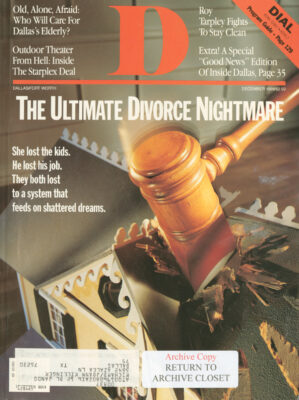A couple of buildings away from Joe Johnson’s office, there is a burned-out house with its door always open. In the darkest corner of the house, a rickety plastic coffee table is littered with ashtrays and glass pipes for smoking crack cocaine. Two men lie on couches around the table with blankets pulled up to their necks. One man opens his glazed, yellowed eyes when Dallas Police Lieutenant David Goelden shines a flashlight in his face. The light illuminates hundreds of tiny plastic bags that once contained crack, one “hit” each, with a street value of $10 to $30. “This whole neighborhood used to be just like this,” Goelden says, “before Joe came.”
Joe Johnson has carved a veritable oasis from this South Dallas desert of burned-out and abandoned houses that are used as crack dens. He is the full-time landlord and owner of eight apartment buildings with a hundred units that are 85 percent occupied by what Johnson calls good people, the kind who don’t use or sell drugs. “Drugs is our biggest problem,” Johnson says, waving his arm to indicate not just his own apartment world, but the whole neighborhood that lies a few blocks southwest of Fair Park. And the solution to that big problem will not come from the government, the police, or any “outside” organization, says Johnson. It will come from people like himself who live and work in the neighborhood, and who aren’t afraid to make it a better place to live.
When a new tenant moves in, Johnson explains in his soft but deadpan-serious voice that he doesn’t allow the sale or use of any drugs. If Johnson finds out later that the tenant is using or selling drugs, he confronts the offender, alone and unarmed. “I tell them I know what’s going on, and that they have so many days to move out. And they do it.” The dealers leave without trouble, Johnson knows, because it’s not difficult for them to find another place where the landlord doesn’t care what they do, and because Johnson has an ace up his sleeve-the Dallas Police. In Johnson’s office on Grand near Oakland, he has set up a police break room with free coffee, soft drinks, and juices, as well as a couple of desks and phones from which the officers can file reports. And he has the support of many of his residents and neighbors who have enlisted in his Hope Crime Watch.
Still, Johnson sometimes feels he’s fighting alone. He would like to buy more apartments (he purchased his current units from North Dallas developer George Macatee), but he says the city’s large banks won’t loan him money. He wants to get all the property owners organized, but too many of them live out of the city and don’t seem to care what happens to their property. He wants the city to condemn and bulldoze the houses unsuitable for anything but rats and crack “’heads,’” but he says the housing officials are slow and inefficient. So far. Johnson’s main weapons are his own money and time. He manages to keep a constant pressure on both the local drag dealers and the city housing officials. “It’s a struggle,” Johnson says, “but we’re keeping on going.”
Lieutenant Goelden stands in front of Johnson’s main apartment building, where all the paint is fresh and the grass is trimmed. “This neighborhood has improved immensely over the past year,” he says, “and it’s because of the involvement of landlords like Joe. If we had more people like him, we’d combat this crime.” Johnson, his sense of mission overcoming his modesty, says, “If we had ten people like me, this whole part of South Dallas would be 100 percent better.”
Get our weekly recap
Brings new meaning to the phrase Sunday Funday. No spam, ever.
Related Articles

Arts & Entertainment
DIFF Documentary City of Hate Reframes JFK’s Assassination Alongside Modern Dallas
Documentarian Quin Mathews revisited the topic in the wake of a number of tragedies that shared North Texas as their center.
By Austin Zook

Business
How Plug and Play in Frisco and McKinney Is Connecting DFW to a Global Innovation Circuit
The global innovation platform headquartered in Silicon Valley has launched accelerator programs in North Texas focused on sports tech, fintech and AI.

Arts & Entertainment
‘The Trouble is You Think You Have Time’: Paul Levatino on Bastards of Soul
A Q&A with the music-industry veteran and first-time feature director about his new documentary and the loss of a friend.
By Zac Crain


